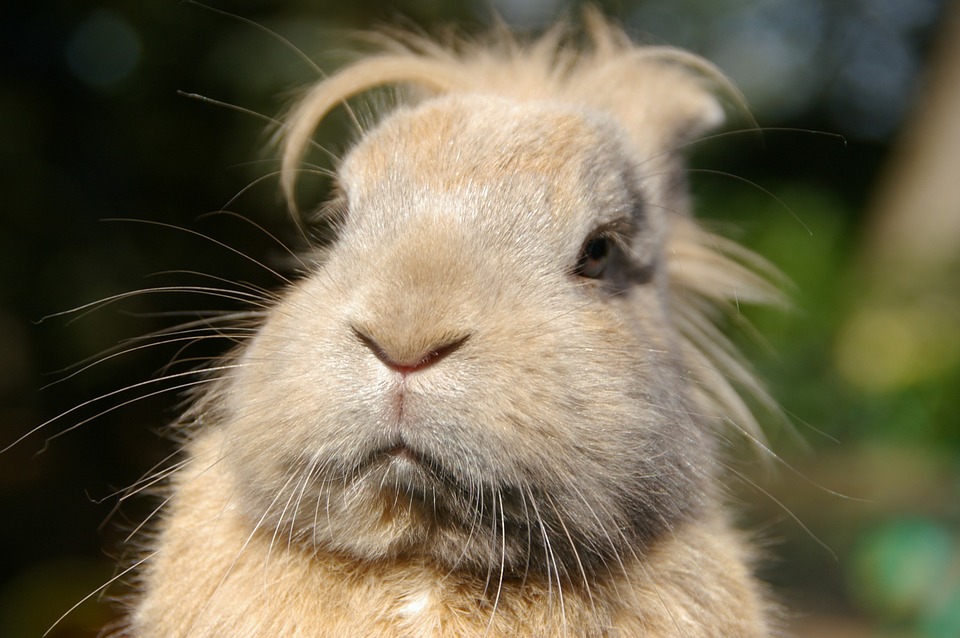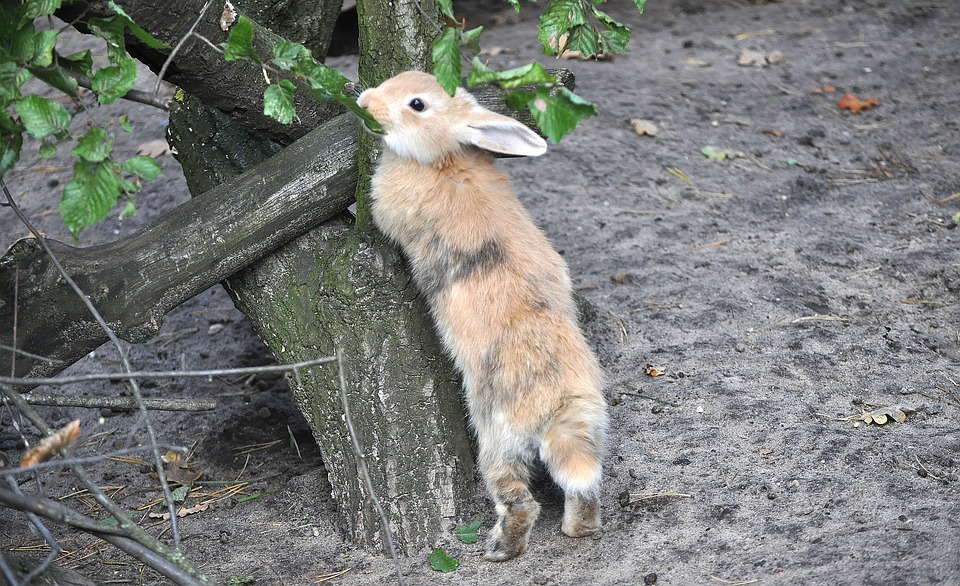This article delves into the fascinating world of rabbit digestion, exploring the question of whether these adorable creatures actually fart. We'll unravel the mysteries behind their unique digestive system, from their unique ability to digest fibre to the surprising truth about their gas emissions. Join us as we discover the secrets behind bunny digestion and uncover the unexpected truth about rabbit farts.
Part 1: A Journey Through the Rabbit's Digestive Tract

1.1: A Look at the Rabbit's Anatomy
- Rabbits have a complex digestive system, specifically designed to break down their high-fibre diet. Unlike humans, they have a long, complex digestive tract, with several distinct parts.
- Starting with the mouth, they have strong incisors for gnawing on fibrous food, followed by premolars and molars for grinding and breaking down the material further.
- The stomach, although relatively small, is crucial for initial digestion. It secretes enzymes that begin the breakdown of carbohydrates and proteins.
- The small intestine is where most nutrient absorption occurs, with the help of digestive enzymes and bile from the liver and gallbladder.
- Finally, the large intestine, including the caecum, plays a critical role in the digestion of fibre and the production of essential nutrients.
1.2: The Marvel of Hindgut Fermentation
- Unlike humans and many other animals, rabbits are hindgut fermenters. This means the majority of their digestion happens in their large intestine, specifically the caecum.
- The caecum is a large, pouch-like organ that houses a vast population of beneficial bacteria, collectively known as the gut microbiota.
- These bacteria are essential for breaking down cellulose, a complex sugar found in plant cell walls, which humans cannot digest.
- The bacteria in the caecum ferment the cellulose, releasing fatty acids, vitamins, and other essential nutrients that are absorbed by the rabbit.
1.3: The Importance of Fibre for Rabbit Health
- Fibre is the cornerstone of a rabbit's diet, providing essential roughage that stimulates their digestive system and promotes healthy bowel movements.
- A high-fibre diet, consisting primarily of hay, grasses, and vegetables, keeps their digestive tract functioning efficiently, preventing digestive issues like stasis, a condition where the digestive tract slows down.
- Fibre also plays a crucial role in the production of caecotrophs, soft pellets rich in nutrients that rabbits re-consume.
- A lack of fibre in a rabbit's diet can lead to various health problems, including digestive issues, dental problems, and obesity.
Part 2: The Two-Stage Digestion Process: Caecotrophy

2.1: The First Stage of Digestion
- The first stage of digestion begins in the mouth, where rabbits use their incisors to gnaw and their molars to grind their food, breaking it down into smaller particles.
- This partially digested food then travels through the stomach and small intestine, where basic nutrients are absorbed.
- However, a significant portion of the food, particularly the fibre, remains undigested and moves into the large intestine.
2.2: The Second Stage: The Role of the Caecum
- The undigested fibre reaches the caecum, where the magic of hindgut fermentation takes place. Here, the beneficial bacteria break down the cellulose into digestible nutrients.
- The caecum also absorbs water and electrolytes, forming soft, mucus-covered pellets known as caecotrophs.
- These caecotrophs are rich in essential vitamins, minerals, and amino acids that are not fully absorbed during the first stage of digestion.
2.3: The Curious Case of Caecotrophy
- Rabbits practice caecotrophy, a unique behaviour where they consume their own caecotrophs directly from their anus, usually in the early morning hours.
- This second ingestion allows them to re-absorb the essential nutrients that were initially missed during the first stage of digestion.
- Caecotrophy is crucial for rabbit health and allows them to thrive on their high-fibre diet by maximising nutrient absorption.
Part 3: The Truth About Rabbit Farts
3.1: The Myth of the Gassy Bunny
- Contrary to popular belief, rabbits don't actually fart as we commonly understand the term. Their digestive system is highly efficient, minimising gas production.
- The combination of their hindgut fermentation and caecotrophy effectively eliminates the potential for excessive gas buildup.
- The bacteria in their caecum break down fibre efficiently, producing minimal amounts of gases that contribute to flatulence in other animals.
- The re-absorption of nutrients from caecotrophs further reduces the amount of undigested material that could lead to gas production.
3.2: The Occasional Exceptions
- While rabbits generally don't fart, there are rare occasions when they may experience gas release. These are often related to dietary changes or health issues.
- Introducing new foods into their diet, especially those that are high in fermentable carbohydrates, can disrupt their gut bacteria balance and lead to gas production.
- Health issues, such as digestive problems, infections, or parasites, can also contribute to increased gas release.
- If you notice your rabbit experiencing excessive gas, it's important to consult a veterinarian to rule out any underlying health concerns.
Part 4: Signs of Digestive Issues in Rabbits
4.1: Recognizing the Warning Signs
- Changes in appetite, including decreased food intake or refusal to eat, are often the first indication of a digestive problem.
- Diarrhoea or constipation are also significant signs, indicating a disruption in their normal bowel function.
- Unusual lethargy or inactivity can suggest discomfort or pain related to digestive issues.
- Bloating or distention of the abdomen, often accompanied by discomfort, can indicate gas buildup or other digestive problems.
- Changes in faecal pellets, including decreased production, softer pellets, or the presence of caecotrophs outside their normal time frame, are red flags for digestive issues.
4.2: The Importance of Prompt Veterinary Care
- If you notice any of these symptoms, it's crucial to seek veterinary attention promptly. Early diagnosis and treatment can significantly improve the chances of a full recovery.
- Avoid attempting to self-treat, as improper care can worsen the situation and potentially lead to serious health complications.
- A veterinarian can perform a thorough examination, run necessary tests, and provide appropriate treatment based on the underlying cause of the digestive issues.
Part 5: Maintaining a Healthy Digestive System for Your Rabbit
5.1: The Power of a Balanced Diet
- A diet consisting primarily of high-quality hay should be the cornerstone of a rabbit's nutrition. Timothy hay, with its high fibre content, is an excellent choice.
- Fresh vegetables should be offered in moderation, and it's essential to introduce new foods gradually to avoid digestive upset.
- Avoid feeding sugary treats, processed foods, or foods high in fat, as these can disrupt their digestive system and lead to health problems.
- A veterinarian can provide a tailored diet plan based on your rabbit's age, breed, and health status.
5.2: Providing Fresh Water
- Ensure a constant supply of fresh, clean water to keep their digestive system hydrated. Water is essential for the proper function of digestion and the production of caecotrophs.
- Check their water bowl frequently and replenish as needed, ensuring it's always filled with fresh water.
- You can also offer water in a variety of ways, such as a sipper bottle or a ceramic bowl.
5.3: Maintaining a Clean Environment
- Keep their living space clean and hygienic to reduce the risk of infections or parasites that can affect their digestion. Clean their litter box regularly and replace soiled bedding.
- Ensure their water bowls and food bowls are washed regularly to prevent contamination.
- A clean environment not only promotes digestive health but also overall well-being and prevents stress, which can also affect their digestive system.
Part 6: Exploring Common Questions
6.1: Why Do Rabbits Eat Their Own Droppings?
- The droppings they eat are not actual faeces but caecotrophs, which are soft, nutrient-rich pellets produced by their caecum.
- This behaviour, known as caecotrophy, allows rabbits to re-absorb essential nutrients that they may have missed during the initial digestion process.
- Caecotrophs are a vital part of a rabbit's diet, ensuring they obtain all the necessary vitamins, minerals, and amino acids for optimal health.
6.2: What are the Risks of Not Eating Caecotrophs?
- Not eating caecotrophs can lead to deficiencies in essential nutrients, potentially causing health problems. This can range from mild issues to more serious conditions.
- It can also contribute to digestive issues, such as diarrhoea, constipation, and stasis. These conditions can significantly impact their health and well-being.
- If you notice your rabbit not eating caecotrophs, it's crucial to consult a veterinarian to rule out any underlying medical conditions.
6.3: Can I Change My Rabbit's Diet to Reduce Gas?
- While dietary changes can influence gas production, it's crucial to avoid making drastic alterations without veterinary guidance.
- Sudden diet changes can disrupt their digestive system, leading to more gas, digestive upset, or other health issues.
- If you have concerns about your rabbit's diet, consult a veterinarian who can provide tailored advice based on their individual needs.
6.4: Are There Any Breeds More Prone to Digestive Problems?
- Certain rabbit breeds, such as the Dutch rabbit, are known to be more susceptible to digestive issues due to their smaller size and sensitive digestive systems.
- However, any rabbit breed can experience digestive problems, making it essential to provide proper care and monitor their health closely.
- A veterinarian can offer specific recommendations based on your rabbit's breed and individual needs.
6.5: How Can I Tell if My Rabbit Has a Healthy Digestive System?
- A healthy rabbit will have regular bowel movements, producing firm, rounded faecal pellets. They will also have a good appetite and be energetic and playful.
- If you notice any changes in their behaviour, appetite, or bowel movements, it's crucial to consult a veterinarian to rule out any health issues.
- Regular veterinary checkups are also essential for maintaining a rabbit's overall health and catching any potential problems early on.
6.6: What are the Symptoms of a Rabbit's Stasis?
- Stasis, or gastrointestinal stasis, is a serious condition where the digestive tract slows down or stops moving altogether.
- Symptoms include decreased appetite, lethargy, bloating, and a lack of faecal production.
- If you suspect your rabbit has stasis, seek immediate veterinary attention, as this condition can be life-threatening.
Everyone is watching
-

Do Rabbits Lay Eggs? (The Surprising Truth)
OTHER TYPES OF PETSThis article will unravel the common misconception that rabbits lay eggs, exploring the fascinating world of r...
-

What's a Group of Rabbits Called? (A Comprehensive Guide)
OTHER TYPES OF PETSThis article delves into the fascinating world of rabbits, exploring the various terms used to describe a grou...
-

Can Rabbits Eat Grapes? A Guide to Safe Rabbit Treats
OTHER TYPES OF PETSThis comprehensive guide will explore the safety and suitability of grapes for rabbits, providing detailed inf...
-

Predators That Hunt Rabbits: A Guide to Natural Enemies
OTHER TYPES OF PETSI've always been fascinated by the circle of life, that delicate dance between predator and prey. Growing up ...
-

Are Rabbits Nocturnal Animals?
OTHER TYPES OF PETSThe question of whether rabbits are nocturnal animals is a fascinating one, with a surprisingly complex answer...
